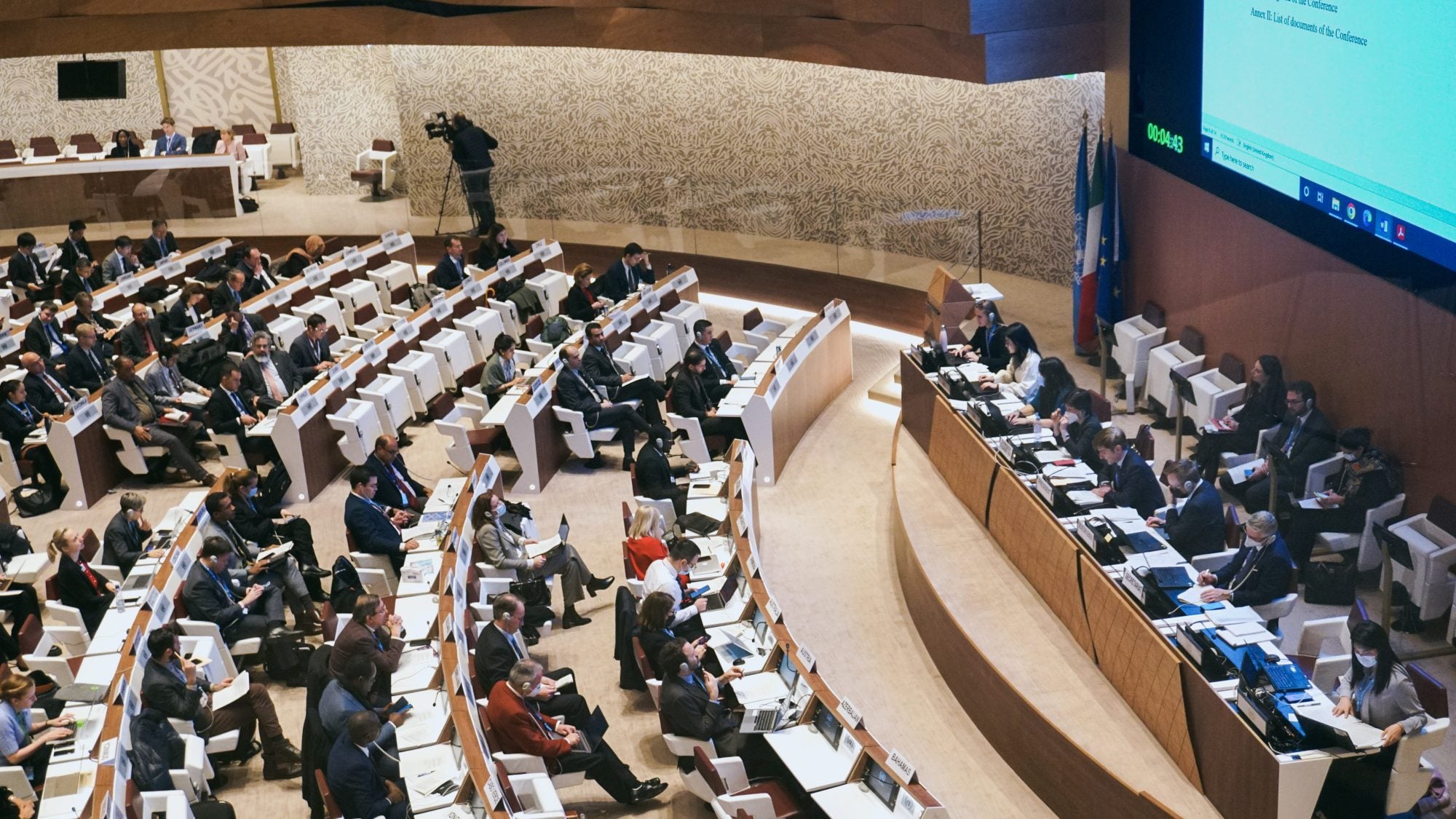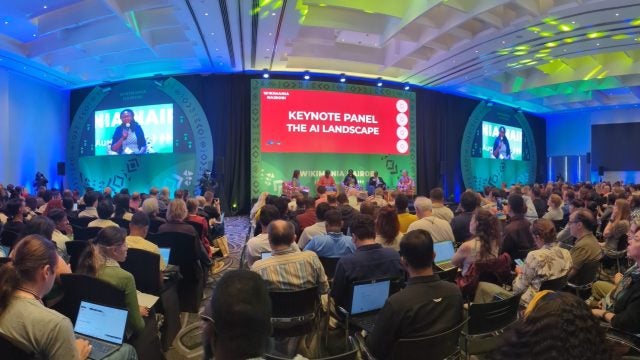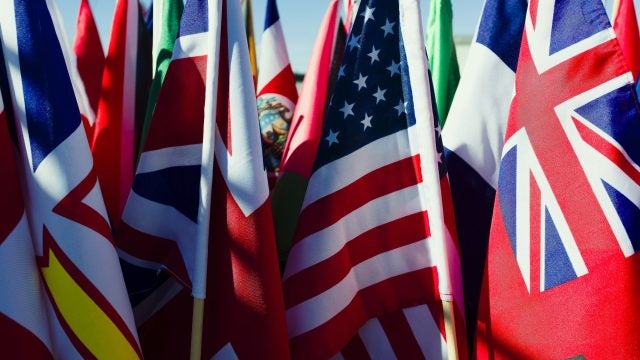
Title: Biological Weapons Convention: In the Crosshairs of Geopolitical Tensions, Part 1
The Biological Weapons Convention has become an outlet for geopolitical tensions heightened by the war in Ukraine. This two-part article charts how the diplomatic battle between Moscow and Washington for control of the narrative on treaty compliance and verification is at a precarious point.
Until recently, the Biological and Toxin Weapons Convention (BWC) had lost political traction. Arms-control diplomats had relegated it to one of the least prioritized disarmament treaties, where, for years, side-events had become more appealing than official plenary meetings. But as war returned to Europe in 2022, the BWC gained significance, becoming one of the release valves for geopolitical tensions between Moscow and Washington. Shortly after the invasion of Ukraine, Russia brought allegations to the United Nations (UN) Security Council claiming US military activities in Ukrainian biolabs. The allegations eventually resulted in a formal consultative meeting under the BWC, efforts to undermine the UN Secretary-General’s ability to investigate allegations of bioweapons use, an unprecedented request to the UN Security Council for an investigation, and a highly politically-charged and exceptionally challenging treaty review conference to round out the year.
According to some, Russia’s initiatives failed on all accounts. But were they simply a series of miscalculations—the rash, backfired efforts of disruption so familiar from other disarmament fora? This does not seem probable. Russia remains a major actor in the BWC, and one that plays the long game. Moscow’s posturing drove the narrative on BWC verification and compliance, and this will continue unless the opportunity afforded by the new intercessional process agreed at the review conference is seized.
Allegations of BWC Non-Compliance
Although Moscow’s 2022 actions have been built from decades-long powerplays with Washington, they initially began ramping up in 2020. That year, the US Department of Commerce placed three Russian “Ministry of Defense facilities associated with the Russian biological weapons program” on its list of entities considered to pose a security risk to US interests, which made them subject to export control restrictions. The same year, Russia introduced a draft resolution to the UN General Assembly’s First Committee that purported to update the UN’s mandate to investigate alleged bioweapons use. However, several states had grave misgivings since the resolution implied there was a problem with the so-called “UN Secretary-General’s Mechanism” and the suggested updates would weaken its credibility and independence. The resolution was overwhelmingly rejected with 63 votes against.
Political posturing continued to escalate in 2021. In April, the US Department of State’s annual compliance report explicitly assessed for the first time that Russia maintained an offensive biowarfare program and that Russia was in violation of the BWC. The report also raised concerns about Chinese activities with dual-use applications. Yet, no concerns were formally raised by Washington in the context of the BWC. Later in the year, Russia introduced a second take at the draft resolution on the UN Secretary-General’s Mechanism that was also rejected, but this time it was a joint statement by the Chinese and Russian Foreign Ministers in October 2021 that captured the diplomatic biosecurity focus. The statement communicated the strategic partnership of Beijing and Moscow in arms control, and especially in biosecurity—a partnership also expressed in their voting patterns at the UN—and was a clear expression of an expanding political agenda. Specifically, the two foreign ministers reiterated long-standing calls for a legally-binding verification protocol to the BWC and stressed that the US withdrawal in 2001 from the negotiating process on such mechanism was against “the wishes of the overwhelming majority,” even though “consensus was almost reached.” They additionally expressed “serious concerns” about US “military biological activities,” both within and outside its national territory, alleging that over 200 American biolabs were deployed outside of the United States, that these labs function in a non-transparent manner, and that their activities pose serious risks for Chinese and Russian national security.
The joint statement also found its place at the 2021 BWC meeting of states in Geneva a few weeks later. In response, American Under Secretary of State for Arms Control and International Security, Bonnie Jenkins, reiterated claims that “some states continue to possess sophisticated, well-established biological weapons programs,” while simultaneously focusing her statement around promoting a new vision for the BWC, asserting that “the status quo is neither acceptable nor up to the task.” The US statement advanced a new “two-pronged approach” for near-term actions and a working group for longer-term strengthening of the Convention. Importantly, this vision signaled a potential shift in Washington’s 20-year red line against considering verification in the BWC.
Against this backdrop, 2021 closed with many question marks and few hopes of positive outcomes to the upcoming ninth review conference of the BWC. The impasse in the group of the non-aligned movement to agree on a nominee for the review conference presidency left the two vice-chairs (Italy and Romania) in the difficult position of leading the preparatory process, trying to find the right balance between the need to save the review conference from indefinite postponement on the one hand and obtaining a substantive agenda on the other. Yet against expectations, the preparatory committee managed not only to have a relatively substantive discussion but also to agree on the main elements for the organization of the review conference: a President-designate, suitable dates, a room to meet in. Three things that might seem very basic, but none of them–even less, the combination of them–could have been taken for granted only a few days before the close of the meeting.
A Diplomatic Crescendo
It is difficult to say with any certainty whether, in the first quarter of 2022, when options for the review conference (including in terms of dates) were being discussed, some delegations already had a sense of, or even a plan for, what was going to happen in the months ahead.
The strategic partnership Beijing and Moscow initially announced was consecrated at the highest level in early February 2022, when President Putin visited China for the opening ceremony of the Winter Olympic games. The extensive and wide-ranging joint statement that resulted not only spoke broadly of Russia and China’s friendship and international relations entering a new era but also directly discussed biosecurity. Like their foreign ministers, the presidents highlighted the need for a legally-binding protocol to the BWC—a view shared by many countries, especially, but not limited to, the group of the non-aligned movement. The familiar and widely accepted narrative of the need for a legally-binding protocol was carefully linked with the narrative of compliance concerns about US “overseas military biological activities,” again conflating the two narratives, potentially widening their appeal and increasing their legitimacy.
Directly following its invasion of Ukraine, Russia took its allegations to the Security Council. Over a two-month period, the Security Council discussed the allegations three times, and each time there were strong rebuttals from council members as well as from the UN High Representative for Disarmament Affairs, Izumi Nakamitsu, who said the UN was not aware of any biological weapons programs. NATO and G7 states made intelligence disclosures on the possibility of Russia using biological or chemical weapons allegations as a pretext to employ unconventional weapons in its war against Ukraine, and both NATO and G7 members noted that any such use would result in severe consequences.
Finally, in mid-June, Russia formally brought its allegations within the context of the BWC. Initially, Moscow made bilateral requests to Washington and Kyiv to answer “questions” about their bioactivities in Ukraine. However, within two weeks, Russia decided that no substantive response had been provided and requested a formal consultative meeting under Article V of the Convention, marking the second time in history such a meeting had been called (the first being in 1997, when Cuba filed allegations against the United States).
During the organizational meeting for the formal consultative meeting in late July 2022, chaired by the UK as a depositary of the Convention, it became apparent that at least two interpretations of this process were possible. First, some actors viewed the meeting as an opportunity for dialogue between the three interested parties, one that could hopefully lead to clarity but would likely result in the repetition of arguments without conclusion. Second, others looked at the meeting as a sort of mock trial, with a prosecutor, a defendant and, most significantly, a verdict. To some, it could appear that these two visions do not contradict each other, since mediation and hearing are phases of many dispute settlement mechanisms, but to many, neither approach represented anything more than utilizing the stage for delivering a message (some would say “propaganda”) to an audience.
One aspect that was clear from the beginning was that there would be no unifying conclusion to the consultative meeting, a prediction that proved accurate. In addition to Russia, Ukraine, and the United States (whose views were clear from the beginning), eighty-nine states participated in the meeting and forty-two of them expressed their views in formal statements. Some delegations had clear and strong views on the issue, with many Western countries defending international cooperation activities against Russian claims of ill-intent, and some countries, including China, questioning American overseas bio-programs. Yet, many states were conspicuously vague in their statements or remained silent, particularly within the group of the non-aligned movement. This silence could be understood as states taking on the role of quietly bearing witness, or simply sitting on the fence. Their non-engagement could also be read, however, as a deliberate protest move—a protest against the hegemonic powerplays of the two blocks the movement was original set up in opposition to and against pushing disinformation that might smear cooperative programs.
The 1997 formal consultative meeting had established a bureau to continue work after the meeting, and it was widely assumed that the 2022 meeting, chaired by Hungary, would follow that precedent. Three out of the six vice-chairs had already been nominated (Canada and the UK for the Western Group, Moldova for the Eastern European Group), but the non-aligned movement held out. At the last moment, China put itself forward for the position, presumably thinking this would allow them to play a greater role in the follow-up process, but the follow-up process never materialized. A last-minute Russian request during the negotiations removed references to it in the final report, in return for a line that clearly recognized the meeting closed without consensual substantive conclusions. Perhaps there was no need for a follow-up process because the message had been delivered: compliance uncertainty remained, and would continue to remain, on the BWC agenda for the review conference, and the uncertainty would continue to paint the United States in a poor light. But even in the short time before the review conference, Russia threw a curveball.
. . .
Dr. Filippa Lentzos is associate professor of science and international security at King’s College London, where she is jointly appointed in the Department of War Studies and the Department of Global Health & Social Medicine. She is also an associate senior researcher at the Stockholm International Peace Research Institute (SIPRI), a non-resident scholar at the James Martin Center for Nonproliferation Studies (CNS), and she serves as the NGO coordinator for the Biological Weapons Convention.
Mr. Tancredi Francese is a career diplomat, currently serving as Deputy Permanent Representative to the Conference on Disarmament at the Italian Mission to the UN in Geneva. He co-chaired the preparatory committee of the ninth BWC review conference and was part of the Italian presidency of the BWC review conference, acting, among other roles, as facilitator for negotiations on the next intercessional process.
Image Credits: BWC Implementation Support Unit
Recommended Articles

This article compares U.S. and Chinese approaches to artificial intelligence (AI) exports in Africa and examines how these disparate approaches have produced both downstream benefits and challenges for the region.

On May 20, 2025, the World Health Assembly unanimously adopted the World Health Organization (WHO) Pandemic Agreement, an international treaty designed to strengthen pandemic prevention, preparedness, and…

As the Trump administration proposes a sweeping overhaul of the US foreign assistance architecture by dismantling USAID, the Millennium Challenge Corporation (MCC), and restructuring the State Department, there is an…